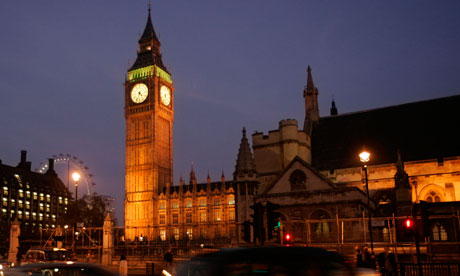Time is spent debating the obvious because the government suspects judges might try to erode parliamentary sovereignty
By Joshua Rozenberg, Guardian, Thursday 13 January 2011 14.42 GMT
 Parliamentary sovereignty kept MPs occupied – again – for much of Tuesday's business in the Commons. Photograph: Lefteris Pitarakis/AP
Parliamentary sovereignty kept MPs occupied – again – for much of Tuesday's business in the Commons. Photograph: Lefteris Pitarakis/APJust as journalists like nothing more than writing about press freedom – look out for heavy coverage next Tuesday when the European court of human rights rules on the Daily Mirror's appeal in the Naomi Campbell privacy case – there is little that some MPs enjoy more than debating parliamentary sovereignty.
How else can we explain why the Commons spent most of Tuesday afternoon and evening discussing a statement of the blindingly obvious: that it is "only by virtue of an act of parliament" that European Union law "falls to be recognised and available in law in the United Kingdom".
This proposition, to be found in clause 18 of the European Union bill, simply declares what most people have understood to be the case ever since we joined the Common Market: that European law is part of UK law only because parliament has passed statutes such as the European Communities Act 1972.
Putting it another way, EU law is not binding merely because ministers have signed various treaties. For it to be enforced in the UK, European law needs parliamentary approval. It follows that if parliament chose to repeal the relevant domestic legislation we would no longer be bound by European law and would have to leave the EU.
So why bother to spell it out? According to David Lidington, the Europe minister, it is because the government fears that "the principle of parliamentary sovereignty, as it relates to European Union law, might in future be eroded by decisions of the United Kingdom's domestic courts".
What worries the government is that uppity judges might decide at some point that EU law had generated its own life-support system, becoming independent of the statute that created it.
As Lidington explained:
"The risk is that British courts might, in future, be attracted to the argument that European law no longer takes effect in this country by virtue of an act of parliament but has become entrenched in our legal system, enjoying an autonomous status".
He fears that even if parliament were to switch off the power supply by repealing the relevant domestic statute, European law would continue to glow in the dark.
This strikes me as pretty unlikely, although passing remarks by some senior judges have given the government limited justification for its suspicions. Even if creative judges did treat EU law as superior to domestic law, parliament could make the position clear by passing an amending statute that the courts would be bound to follow.
Still, it cannot do any harm to provide what the government calls a "clear statutory point of reference, to which the courts would have to have regard".
Or can it? The Eurosceptic MP Bill Cash wanted to go further, arguing that the legislation should reaffirm the "sovereignty of the United Kingdom parliament".
Logically, I cannot see the point of this. If parliament is sovereign, there is no need to reaffirm it. If it is not, then reaffirming it will not make it so. But I am sure Cash will put me right next time I see him.
The minister thought Cash's plans would make matters worse. Since "sovereignty" has never been defined by the courts, putting the term on the statute book "would invite speculative consideration by exactly the kind of ambitious judges" whom Cash feared. But despite a rebellion by 27 Tory MPs, his amendments were defeated on Tuesday night by 314 votes to 39.
All this has not gone unnoticed in Strasbourg, where I spent a couple of days this week talking to officials at the Council of Europe. There, the big story is working out the arrangements under which the EU will sign up to the European convention on human rights.
As well as bringing together Cash's worst fears in a single nightmare, the move will lead to endless confusion for those who cannot remember the difference between the EU court in Luxembourg and the Council of Europe court in Strasbourg.
But if you take the view that the EU is on its way to becoming a European superstate, it makes sense for individuals whose rights it has breached to take the EU to the Strasbourg court in the same way as Max Mosley took the British government to the human rights court on Tuesday.
That is how it strikes me, but I don't suppose the accession arrangements will get an easy ride when they come before parliament, perhaps as early as this autumn. After all, parliament is sovereign, isn't it?

No comments:
Post a Comment